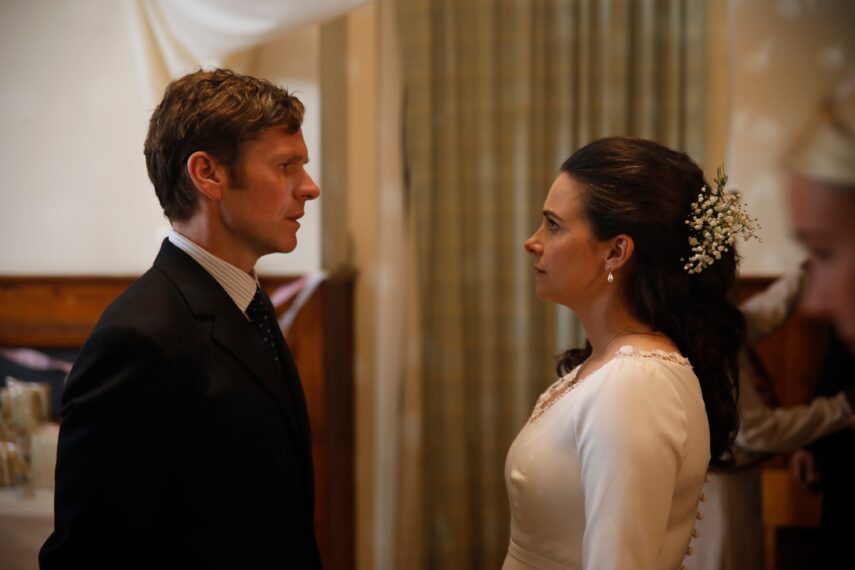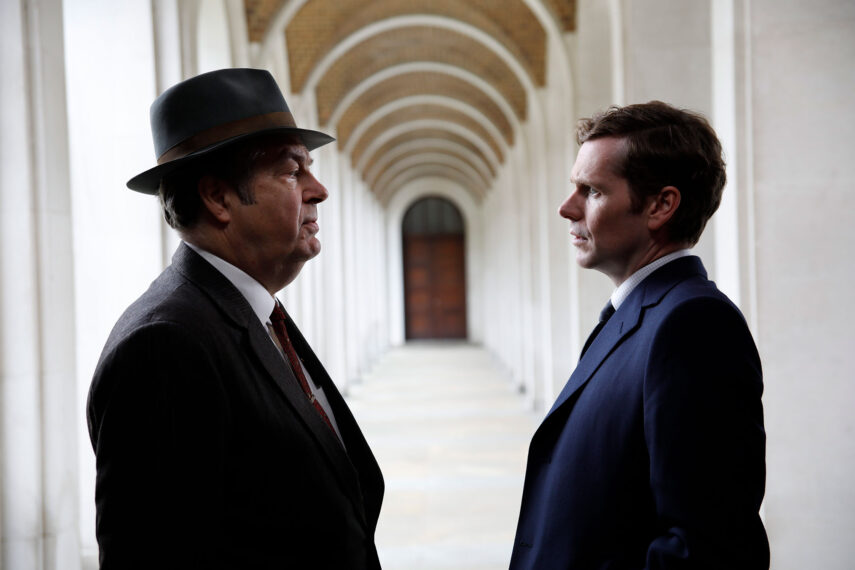It was a prequel that took on a life of its own. Endeavour, the British crime drama that premiered in 2012 and became a staple of PBS’s Masterpiece lineup, ended last summer after 36 feature-length episodes, all written by executive producer Russell Lewis. The smashing conclusion resolved some storylines but left unanswered questions — and may have even changed the way some viewers look at parent series Inspector Morse (1987-2000), based on the novels of Colin Dexter.
In the newer show, the younger Endeavour Morse (Shaun Evans) started out as a somewhat jaded detective constable in 1965 Oxford, and by 1972 had become a massively cynical detective sergeant. The darkness he faced on the job took its toll. So too did drink and heartbreak. The former Oxford University student watched the woman he loved, Joan Thursday (Sara Vickers), marry his colleague Jim Strange (Sean Rigby). Meanwhile, Morse’s mentor, Chief Inspector Fred Thursday (Roger Allam) — Joan’s father — had to leave Oxford to protect his son Sam (Jack Bannon) from danger.
Lewis looks back on the decade-plus he spent writing Endeavour, answering most — but not all — of our questions.
The final season of Endeavour took us back to one of the most memorable cases that Morse and Thursday ever worked — the one involving child abuse at Blenheim Vale boys’ home in Season 2. Was it always your plan to end the show by reopening, and finally closing, that case?
Russell Lewis: I think it was a hanging chad for a long time and it seemed like it was playing fair with the audience to involve that. And it was a great way to bring back Peter Jakes [Jack Laskey].
It was nice to see Sergeant Jakes again, and also Jack Bannon as Thursday’s son, Sam. Had you been looking for an opportunity to bring them back?
To say goodbye would have been very difficult without Sam Thursday. Jack [Bannon] had been doing Pennyworth and he made himself available to us. We’re enormously thankful for that, and that we were able to fold that story into a much bigger tale. It was all about fathers and sons in the end, I guess, of one kind or another.
Who or what is Morse aiming at when he fires the gun Thursday gave him at the end?
[Executive producer] Damian Timmer, the founder of the feast, and I both have slightly different takes on that, and those two views don’t entirely align, so we thought it was more fun to bite our tongues and let the audience draw their own conclusion.
Some viewers were wondering if Morse was considering suicide or if he was just firing the gun in frustration.
That’s certainly possible.
You’re not going to say what your take on it is?
We’ve both sworn ourselves to silence. [Laughs] Sorry, but that’s how it goes.
You said there had to be a reason why the older Morse never mentions Thursday on Inspector Morse, even though the obvious reason is that since Endeavour is a prequel, the character hadn’t yet been created.
There had to be because the canon from the series was that McNutt was the great mentor [in the “Masonic Mysteries” episode of Inspector Morse]. We brought Thursday in as the guy before McNutt, so we needed to find the reason that Endeavour would never speak of him, and the solution that you have onscreen is the truth of it.
To protect him and his family?
I took inspiration from Colin’s last Morse novel, The Remorseful Day. There’s an epilogue spoiler ahead: Strange talks about Morse’s actions across that novel and that everything he had done had been to protect him and Mrs. Strange. That was my jumping-off point. I found that postscript incredibly moving. The person you might think he was protecting is Strange, but from where we’re coming at it he really loved [Joan].

Shaun Evans and Sara Vickers (Mammoth Screen and MASTERPIECE)
So when did you decide that Joan would become Mrs. Strange, whose first name is never mentioned in the original Inspector Morse or Colin Dexter’s novels?
It was very much in my mind from fairly early on. I think I mentioned it to the cast maybe from [Season] 4 or 5. We never knew if we were going to get from one year to the next in the early years, but as soon as it seemed to have a returning invitation each year, I thought if we went the distance that’s where it would go — that he wouldn’t get the girl but would spend the rest of his life in her orbit, and that’s why he never leaves Oxford, certainly from where we were going.
Morse did go out with his share of women, though.
There were interesting conversations when we were making it that we wouldn’t be making a series about a man who lived a monastic life. This was his youth and I thought it was more interesting if he was more fully rounded — that he had relationships, as doomed as they may be. There was a bit of nervousness that we were in some way mussying him a little. I thought it was much richer ground if you saw the relationships not work.
Why have Chief Superintendent Bright (Anton Lesser) recite Shakespeare at the end?
For lots of reasons. The Shakespeare that he was reciting — Prospero from The Tempest — was Shakespeare’s last hurrah. Prospero at the end drowns his books and kind of says goodbye to his magic. It felt that we were saying goodbye in the same way. My original version had him teaching in a school in India. The boys were asking him to do a bit of Shakespeare and that was the piece he chose. But it was beyond our budget to do it, so we just had him at his daughter’s grave. Having Anton do “Our revels now are ended” felt of the moment. I don’t know if it worked for everyone, but it was just a way of saying thank you and goodbye.
Shaun Evans and Roger Allam also got executive producer billing in the last couple of seasons. How much input, if any, did they have?
I remember doing a joint call with them to outline the last two seasons, and I think apart from one or two things they were quite happy. You have further thoughts during production or on the floor on the day as often as not. But we certainly ran everything past them just to make sure there was nothing that they were going to be horrified by. [Laughs]
It’s remarkable to me that you wrote all 36 installments. Did you ever think of handing off an episode or two to another writer?
Once the train has left the station, it’s very difficult for someone to come on and pick up the house style. I hate rewriting other writers, so in the end it was just me seeing it through.
Did you spend much time on the set?
Not in the early years. I’d come out maybe once per season. I was usually writing pretty much till the last week or so because changes would come back, or locations would fall through. The last couple of weeks of shooting is when I’d get free, and then I’d nip in and say hello.
The first time I went out was on [Season] 2. We were in this bizarre old paper mill outside Beaconsfield, and the house that served for the police station had been built by someone that survived the Charge of the Light Brigade. It was a very weird space. In those years we shot in the winter, from September, October through into January. We built the Thursday interior sets in this derelict paper mill and it was open to the elements. So the interior stuff at the Thursday house was shot in arctic temperatures. It’s a bit like when they built Regan’s bedroom in a freezer for The Exorcist. And, surprisingly, thereafter we started shooting in the summer. I wouldn’t be surprised if Shaun and Roger said, “That’s it, we’re not doing any more winter shoots. You might as well send us to Stalingrad.” [Laughs]

Roger Allam and Shaun Evans (Mammoth Screen and MASTERPIECE)
When did you realize this show had a real fan following?
Dan McCulloch, our producer on the [pilot] and then [Season] 1, who’s young, insisted I get on Twitter. Once you get on Twitter you find out very quickly how people feel about things, for better or worse. For the most part, it was for the better for us, so you knew quite quickly that it was connecting with a lot of people. It was most apparent when I’d go to Oxford and people would have come from around the world to watch the shooting. That was just extraordinary.
I saw a tweet years ago from Joyce Carol Oates praising Endeavour.
That’s extraordinary. It always knocks you sideways when people are lovely about it.
Shaun Evans certainly captured the character of Endeavour brilliantly.
Shaun lived and breathed it for all that time and it was an extraordinary feat. A part of him was always Endeavour. I mean, he wasn’t in character for 10 years, but part of his psyche always kept in touch. He played Endeavour as if he had one layer of skin less than everybody else. He was just that much more raw and easily wounded and sensitive and, consequently, guarded with his emotions.
You were a child actor and even appeared in the 1971 movie Sunday Bloody Sunday with Glenda Jackson. Why did you make the transition to writing?
You get to your teenage years and you want to be cast as Travis Bickle, and you’re being cast as someone’s son or the boy next door, so it was madly frustrating. I’d always written since I was a kid, so to pursue writing was essentially to get to play all the parts first and best, at least in your own head. [Laughs] That was the attraction for me — megalomania, essentially.
One other thing about Sunday Bloody Sunday. There’s a shot where we go past this churchyard and three tearaway kids come past and drag a milk bottle along the paintwork of the cars that are parked there. I’m delighted to say I shared the very first screen appearance of Daniel Day-Lewis. I’m watching him at the wall, [he’s wearing a red bandanna]. You can find it on YouTube.
Looking back on Endeavour, what are you most proud of?
I suppose that we got to finish it, to a certain degree, on our own terms. We didn’t get canceled and leave things up in the air. We were able to end our story in a time of our choosing. I think it’s a testament to everybody that worked on it that we survived as long as we did. It really has meant the world to all of us, to have been so warmly welcomed by so many people and to have the affection they have for the show conveyed to me. And I’m sure we’ll all look back on it with great fondness for the rest of our lives.
With streaming it’s not going anywhere.
You know that Jodie Foster movie Contact that starts with bits of radio waves going up into the cosmos. Somewhere across the cosmos, bits of Endeavour will still be shedding through interstellar space forever. It’s a thought. It’s as close to immortality as any of us will ever get.
Endeavour, Seasons 1-9, PBS app (with Passport)
